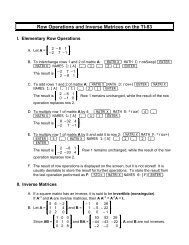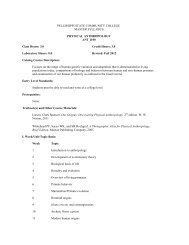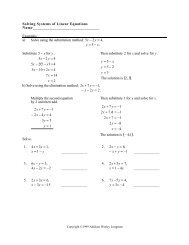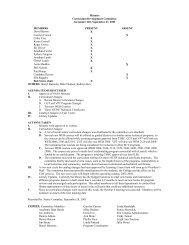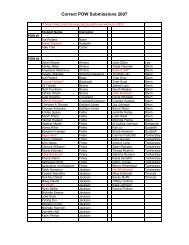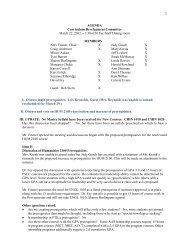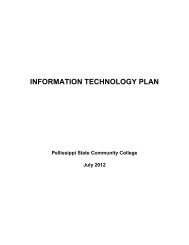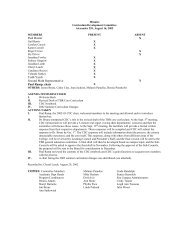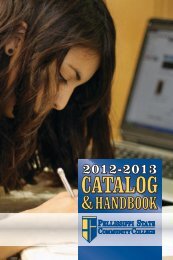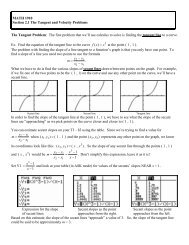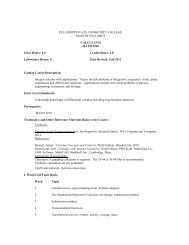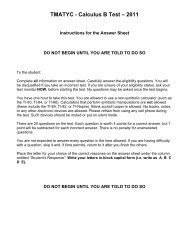Program Description - Pellissippi State Community College
Program Description - Pellissippi State Community College
Program Description - Pellissippi State Community College
Create successful ePaper yourself
Turn your PDF publications into a flip-book with our unique Google optimized e-Paper software.
EDU 2010 Introduction to Teaching & Technology 3 Credits<br />
An overview of school in America, the role and responsibility of the teacher, and an introduction<br />
to instructional technology principles and practices. The course combines classroom<br />
discussion with field observations as a means to analyze the teaching profession. On Demand<br />
Corequisite(s): ENGL1010<br />
EDU 2030 Field Studies in Science Education 2 Credits<br />
Background in elementary science education goals and pedagogies; training in cart demonstrations;<br />
design, preparation, implementation and evaluation of hands-on science activities in<br />
the elementary schools; and development of family science activities. On Demand<br />
Prerequisite(s): Successful completion of a college-level laboratory science course or two<br />
years of high school science<br />
ELECTRICAL ENGINEERING<br />
★ECE 2010 Circuits I 3 Credits<br />
Fundamental laws of circuit analysis: Ohm’s law, Kirchoff’s voltage and current laws and<br />
the law of conservation of energy; circuits containing independent and dependent voltage and<br />
current sources; resistance, conductance, capacitance and inductance analyzed using mesh and<br />
nodal analysis, superposition and source transformations and Norton’s and Thevenin’s theorems;<br />
steady state analysis of DC and AC circuits; complete solution for transient analysis for<br />
circuits with one and two storage elements. Fall Prerequisite(s): CHEM 1120 and CID 1104<br />
and CSIT 1370 and ENS 1310 Corequisite(s): PHYS 2110<br />
★ECE 2020 Circuits II W/Lab 4 Credits<br />
Average, complex, real and imaginary power; effective value of voltage and current; threephase<br />
circuits; delta and wye connections, power measurement using two wattmeters; complex<br />
frequency; sinusoidal forcing functions and natural response; resonance: general case, special<br />
cases in series and parallel circuits; scaling: magnitude and frequency; mutual inductance<br />
transformers as circuit elements; linear and ideal transformers as circuit elements; linear and<br />
ideal transformers; admittance, impedance and hybrid parameters; trigonometric and complex<br />
Fourier series. Course includes 3 hours of lecture and 3 hours of laboratory applications each<br />
week. Spring Prerequisite(s): ECE 2010 Corequisite(s): MATH 2110 and PHYS 2120<br />
ELECTRICAL ENGINEERING TECHNOLOGY<br />
EET 1001 Introduction to Electrical Engineering Technology 1 Credit<br />
The student is introduced to electronic instrumentation (with particular emphasis on the oscilloscope)<br />
and soldering techniques. An introduction to printed circuit board layout, schematic<br />
software and laboratory reports on personal computers are also covered. Spring and Fall<br />
EET 1012 Electrical Circuits I W/Lab 3 Credits<br />
An introductory course in DC and AC circuits. Topics include atomic structure, current and<br />
voltage, resistance and power. Ohm’s Law and series and parallel circuits are covered.<br />
Transient response for capacitors and inductors are also discussed. The course includes fundamental<br />
AC concepts and phasor calculations for impedance, voltage, and current in RLC circuits.<br />
There will also be discussion of ladder logic and introduction to motors and transformers.<br />
Spring and Fall Corequisite(s): MATH 1730<br />
EET 1022 Electrical Circuits II W/Lab 5 Credits<br />
A continuation of EET 1012. This course extends DC topics to include Network Theorems<br />
such as Thevenin and Norton equivalent circuits. AC topics are covered in more detail and<br />
include series and parallel resonance, filters, and three-phase power. Transformers and motors<br />
are also covered in more depth than in Circuits I. Spring and Fall Prerequisite(s): EET 1012<br />
EET 1210 Active Devices I W/Lab 4 Credits<br />
An introductory course in solid-state devices and the basic circuits in which they are used.<br />
Topics include semiconductor physics, diode circuits, bipolar transistor circuit analysis and<br />
FET circuit analysis, and operational amplifiers. Spring and Fall Prerequisite(s): EET 1012<br />
◆ Meets <strong>Pellissippi</strong> <strong>State</strong> and Tennessse Board of Regents minimum degree requirements. ★ Transfers as equivalent course to the University of Tennessee, Knoxville.<br />
207



